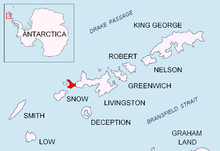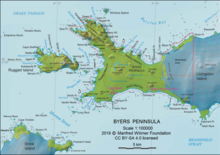Sàbat Hill
 From Wikipedia the free encyclopedia
From Wikipedia the free encyclopedia



Sàbat Hill (Bulgarian: хълм Сабат, ‘Halm Sàbat’ \'h&lm 'sa-bat\) is the ice-free hill rising to 151 m in Dospey Heights on the Ray Promontory of Byers Peninsula, Livingston Island in the South Shetland Islands, Antarctica. Surmounting Richards Cove to the west-northwest and Barclay Bay to the east.
The feature is part of the Antarctic Specially Protected Area ASPA 126 Byers Peninsula, situated in one of its restricted zones.[1]
The hill is named after Francesc Sàbat from Juan Carlos I Base who, together with Jorge Enrique, made the first ascent of the island's summit Mount Friesland (1700 m) on 30 December 1991.
Location
[edit]Sàbat Hill is located at 62°34′59.8″S 61°08′18.0″W / 62.583278°S 61.138333°W, which is 1.36 km north of Battenberg Hill, and 560 m southeast of Voyteh Point that is formed by an offshoot of the hill. Spanish mapping in 1992, and Bulgarian in 2010.
Maps
[edit]- Península Byers, Isla Livingston. Mapa topográfico a escala 1:25000. Madrid: Servicio Geográfico del Ejército, 1992.
- L.L. Ivanov et al. Antarctica: Livingston Island and Greenwich Island, South Shetland Islands. Scale 1:100000 topographic map. Sofia: Antarctic Place-names Commission of Bulgaria, 2005.
- L.L. Ivanov. Antarctica: Livingston Island and Greenwich, Robert, Snow and Smith Islands. Scale 1:120000 topographic map. Troyan: Manfred Wörner Foundation, 2009. ISBN 978-954-92032-6-4
- L.L. Ivanov. Antarctica: Livingston Island and Smith Island. Scale 1:100000 topographic map. Manfred Wörner Foundation, 2017. ISBN 978-619-90008-3-0
Notes
[edit]- ^ Management Plan for Antarctic Specially Protected Area No. 126 Byers Peninsula. Measure 4 (2016), ATCM XXXIX Final Report. Santiago, 2016
References
[edit]- Bulgarian Antarctic Gazetteer. Antarctic Place-names Commission. (details in Bulgarian, basic data in English)
- Sàbat Hill. SCAR Composite Gazetteer of Antarctica
External links
[edit]- Sàbat Hill. Copernix satellite image
This article includes information from the Antarctic Place-names Commission of Bulgaria which is used with permission.